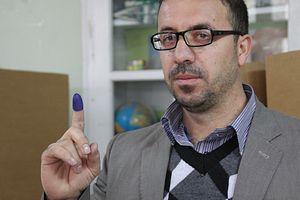Six women were arguing with the security guards of Zarghuna High School in central Kabul to let them enter the compound for voting. The guards argued that it was already 5 p.m. and the women could not be let in as voting had closed. Still, the women insisted. The head of security came in and he too tried to drive in the point that the p.m. deadline had passed but the women contended that a few minutes here and there did not make much of a difference and if they missed the chance this time they would have a long wait ahead of them to vote, which they said they did not want to do. Seeing their determination, the chief relented and allowed them to enter the school and they were ushered into the last classroom where the ballot box was just about to be sealed. The women voted and left the school flashing their inked fingers.
This was the mood in Afghanistan on Saturday when the country voted for in its first democratic transition of government; the country had never seen this kind of zeal to vote. According to initial estimates given by the Independent Election Commission, 7 out of twelve million registered voters cast their vote on April 5th, meaning close to 60 percent of eligible voters came out to exercise their democratic rights. The turnout is double what it was in the 2009 elections. It was higher than the first elections in 2004 as well.
But elections cannot be confined to numbers only. One has to fathom the enthusiasm and excitement of the voters to quantify the electoral exercise in a country which is making a history by transferring power through democratic means, a feat Afghanistan has never accomplished in its history so far.
“I was really keen to vote in these elections. I cannot pick up guns, but I have my vote to defeat the forces which have made our life hell and which have reduced such a great country to the margins of all parameters of social and economic development,” says Tahira, one of the six women who were the last ones to vote in Zarghuna elections.
“You know, the killing of female journalists a few days ago jolted me and disturbed me a lot. How long can we allow the Taliban to treat women as a substandard human beings. We don’t want to see the return of extremist forces in this country again, those who made us refugees in our own country,” retorted Sajida, 49, after casting her vote late Saturday evening. A teacher by profession, she recalls the days lived under the Taliban regime between 1996 to 2001 as “the worst nightmare of my life.”
The mood for change was something unique. No matter which polling station you went to, the queue beat all previous records. Lines started forming early in the morning. Within one hour of opening, polling centers were overflowing with people.
This is the same Kabul which not long ago used to witness intense gunfights among rival Mujahideen forces for political control; the city was now making history by casting its votes to transfer power to a legitimate winner.
“The people of Afghanistan want a new future for themselves. They don’t want a repeat of a past that has ruined two generations. It makes us proud as Afghans today that we have stood united, seeking a new destiny for the country. This election means a lot to us,” says Bilal Sarwary, a BBC journalist who has been working in the country since 2001 and has seen the landlocked nation emerge from the ashes of destruction.
For Bilal, who is in his 30s, it’s an emotional moment. After April 5th, he sees “a new hope for his country.” For someone who spent his formative years as a refugee in Pakistan, he does not want a repetition of the same fate for the country’s new generation.
“I don’t want the currency and passport of my country to be turned into pieces of tissue paper again. It was very humiliating to live as a refugee in another country. I want this country to grow and develop as a modern nation,” says the journalist, who has traveled extensively across the country in the past ten years.
Two days after the elections, it is still not clear who is actually leading and its also not clear if the candidate who appears to be leading now will be the eventual victor or not. Ashraf Ghani and Abdullah Abdullah seem to be in the forefront now, leaving behind Zalmai Rassoul, the third main contender. But political experts are not willing to bet on a final winner yet. It will take weeks before a clearer picture emerges.
“The elections will go to the second round and it does not matter who wins or loses; it will be a victory for democracy,” said Rassoul in an interview with The Diplomat.
No candidate has come out with serious complaints of electoral malpractice as was the case in 2009.
Not long ago there was a great deal of apprehension about the way events were going in the run up to the elections. Now there is a new sense of confidence and curiosity about the future.
“I have not seen this kind of mood in the country before. I suddenly feel more certain about myself and my future in this country. Never before have the people of Afghanistan spoken so clearly and loudly against the Taliban as they have done today,” asserts Burhan Akbari, a young telecom professional who returned to his native country four years ago from Canada after living there for a decade.
For now, ballots seem to have silenced the Taliban’s bullets. It’s now time for the political leadership of the country to uphold the trust that the people of Afghanistan have reposed on them. If they fail now, history will not forgive them.




































